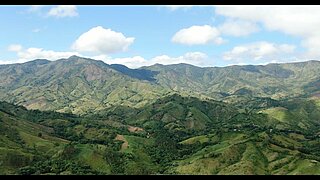Ecosystem-based Adaptation and forest restoration in vulnerable rural communities within the Caribbean Biological Corridor
The level of ecosystem diversity in the Caribbean is among the highest in the world. However, both the region and its valuable ecosystems are under severe threat from the impacts of climate change and human overuse. The project uses ecosystem-based adaptation (EbA) measures to increase the resilience and adaptability of the people and ecosystems in the partner countries, thus improving the livelihoods of the rural population at the same time. In participatory processes, the project develops strategic EbA plans, based on which targeted afforestation and soil improvement measures are implemented. It supports farmers in applying adapted production techniques and optimising the value chains of agricultural, agroforestry and silvopastoral systems. In addition to supporting the mainstreaming of EbA in local and national plans, the project also trains and networks key players, helping them to plan EbA measures.
- Countries
- Cuba, Dominican Republic, Haiti
- IKI funding
- 19,999,576.00 €
- Included preparation phase
- 172,354.80 €
- Duration
- 11/2019 till 10/2027
- Status
- open
- Implementing organisation
- Deutsche Welthungerhilfe e.V.
- Political Partner
-
- Ministry of Environment and Natural Resources - Dominican Republic
- Ministry of Science, Technology and the Environment (CITMA) - Cuba
- Ministry of the Environment - Haiti
- Implementing Partner
-
- Centro Oriental de Ecosistemas y Biodiversidad (BIOECO)
- Centro para la Educación y Acción Ecológica, Naturaleza, CEDAE
- Concertation y Action pour le Développement (Concert-Action)
- ENDA Dominicana
- OroVerde - Die Tropenwaldstiftung
State of implementation/results
- Some important results in numbers: Over two million fruit and forest tree seedlings were distributed and planted. More than 2,000 rural households were supported in implementing EbA measures. For 695 households their access to water has improved, and over 2,400 hectares of land have been rehabilitated, reforested, and conserved. Around 10,800 people were reached through awareness campaigns and trainings on EbA, climate change, and environmental protection. In addition, 16 local EbA committees were created or consolidated applying a multi-actor-partnership (MAP) approach, and nine Ecosystem-based Adaptation (EbA) plans were finalized or are in the final phase of revision.
- In line with the above mentioned EbA plans and in collaboration with local EbA committees, project partners are currently selecting areas and participants for the implementation of EbA activities, including erosion control measures, tree nurseries, reforestation and the creation of household vegetable gardens and compost bins. The selection process is accompanied by training sessions and awareness campaigns.
- At the same time, project partners started to further elaborate replication models for the planned EbA activities and assess the level of integration of EbA into public policies and plans in the project countries.
- In addition, gender assessments and trainings were completed in the three partner countries, new monitoring tools were developed and rolled out to standardize data collection and storage, a knowledge management initiative was put in place to identify and document lessons learned and best practices, and communication strategies for each partner were finalized.
Latest Update:
04/2025
Further links
- Facebook-Seite des Projektes
- COP27 side event (video)
- Dominican Republic: Resilient Caribbean Communities - Back to cooperating with Nature (video)
- Haiti: Resilient Caribbean Communities - Back to Cooperation with Nature (video)
- Cuba: Intervention on national television (video)
- Regional Newsletter February 2025
Project relations
Legend:
The link has been copied to the clipboard
Related Publications
-
 09/ 2022 | IKI Evaluation
09/ 2022 | IKI EvaluationExecutive Summary for the Mid-Term Evaluation "Ecosystem-based Adaptation and forest restoration in vulnerable rural communities of the Caribbean Biological Corridor"
German (PDF, 713 KB, barrier-free)
English (PDF, 800 KB, barrier-free)
Spanish (PDF, 774 KB, barrier-free)
French (PDF, 685 KB, barrier-free)










